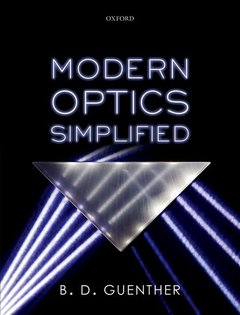Description
Modern Optics Simplified
Author: Guenther Robert D.
Language: English
Subject for Modern Optics Simplified:
Modern Optics Simplified
Publication date: 09-2019
464 p. · 19.3x25.3 cm · Hardback
Publication date: 09-2019
464 p. · 19.3x25.3 cm · Hardback
Modern Optics Simplified
Publication date: 09-2019
464 p. · 18.9x24.4 cm · Paperback
Publication date: 09-2019
464 p. · 18.9x24.4 cm · Paperback
Description
/li>Biography
/li>
This textbook reduces the complexity of the coverage of optics to allow a student with only elementary calculus to learn the principles of optics and the modern Fourier theory of diffraction and imaging. Students majoring in sciences or engineering and taking a standard physics course on optics will find this text useful. Examples of a variety of applications dependent on optics allow the student to connect this course to their particular field of interest. Topics covered include aberrations with experimental examples, correction of chromatic aberration, explanation of coherence and the use of interference theory to design an antireflection coating. Fourier transform optics and its application to diffraction and imaging, use of Gaussian wave theory, and fiber optics make the text of interest to those in electrical and bioengineering as well as physics and medical science. The text includes hundreds of photos, figures and diagrams to provide readers with strong visual insights into optics. More difficult, optional topics are highlighted throughout, and the need for experience with differential equations and extensive use of vector theory are avoided by using a one dimensional theory where possible. Maxwell's equations are introduced only to determine the properties of a light wave, and the boundary conditions are introduced to characterize reflection and refraction. Most discussion is limited to reflection. The book also introduces Fourier transforms as they are needed in the discussion of diffraction and imaging.
Robert D. Guenther received his undergraduate degree from Baylor University and his graduate degrees in Physics from the University of Missouri. He has had research experience in condensed matter, high energy lasers, and optical physics. For nine years he was active in research management as a senior executive in the US Army, and was responsible for physics research sponsored by the Army. After retiring from the government, Dr. Guenther held the position of Interim Director of the Free Electron Laser Laboratory and Executive Director at Fitzpatrick Center for Photonics and Communication Systems at Duke University. He has 30 years' experience teaching undergraduate optics. He retired from teaching and worked in two start-up companies developing products related to imaging and spectroscopy.
© 2024 LAVOISIER S.A.S.
These books may interest you

Optics for Engineers 220.72 €

Basic OpticsPrinciples and Concepts 182.55 €

Introduction to Optics 70.08 €

